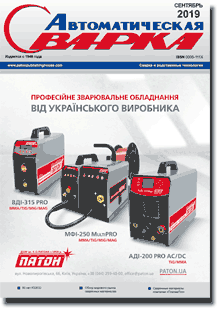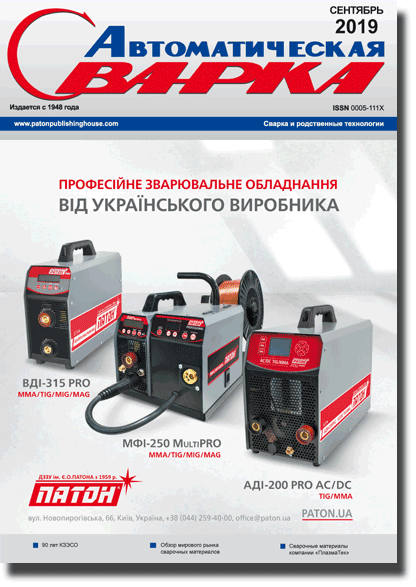| 2019 №09 (01) |
DOI of Article 10.15407/as2019.09.02 |
2019 №09 (03) |

Avtomaticheskaya Svarka (Automatic Welding), #9, 2019, pp. 14-25
Effect of cooling cycle of welding on structure-phase composition of 15Kh2NMFA steel
O.V. Makhnenko, V.A. Kostin, V.V. Zhukov, E.S. Kostenevich
E.O. Paton Electric Welding Institute of the NAS of Ukraine. 11 Kazimir Malevich Str., 03150, Kyiv, Ukraine. E-mail: office@paton.kiev.ua
In the recent years mathematical methods are widely used for prediction of microstructure phase composition of structural steels under thermal effect. Using mathematical modelling based on existing parametric regression equations there was carried out prediction of microstructure phase transformations in HAZ metal of base material (steel 15Kh2NMFA) of WWER-1000 reactor vessel in arc surfacing of protective corrosion resistant layer as well as performed comparative analysis of modelling results with obtained experimental data of dilatometric and metallographic analysis. The comparison of results ensures formation of bainite-martensite structure in HAZ metal of WWER-1000 reactor vessel, however value of content of martensite in calculation and experimental determination is significantly different. For calculation determination of content of structural constituents it is necessary to use the experimental CCT diagrams of austenite decay for characteristic welding/surfacing thermal cycles, which do not have long-term heating or holding at austenitizing temperature and cooling takes place with variable rate. CCT diagrams of undercooled austenite for typical cooling rates 3-5 °C and two maximum temperatures of thermal cycle, namely 1000 and 1350 °C were experimentally plotted for adequate evaluation of mictrostructure composition in HAZ of vessel steel 15Kh1NMFA in welding/surfacing. Obtained results can be used in calculation determination of residual stresses in WWER-1000 vessel body for grounding the extension of safe operation life. 32 Ref., 7 Tabl., 13 Fig.
Keywords: WWER-1000 reactor vessel, steel 15Kh2NMFA, corrosion resistant surfacing, microstructure transformations, mathematical modelling, dilatometry
Received: 21.05.2019
References
1. (1989) PNAE G-7-002-86: Codes of design on strength of equipment and pipings of nuclear power plants. Gosatomenergonadzor SSSR. Moscow, Energoatomizdat [in Russian].2. Khlybov, A.A., Uglov, A.L. (1998) Determination of physicomechanical characteristics of material of specimens subjected to radiation. Trudy NizhGTU, 1, 220-228 [in Russian].
3. Gurovich, B.A., Kuleshova, E.A., Fedotova, S.V. (2011) Influence of chemical composition and structural parameters of steels of WWER reactor vessels on susceptibility to embrittlement caused by formation of grain-boundary segregations, including under conditions typical for long-term operation of power plants. Moscow, NRC Kurchatov Institute [in Russian].
4. Frolov, A.S. (2013) Phase-structural state and operating characteristics of new compositions of steels for reactor vessels with higher power and service life: Syn. of Thesis for Cand. of Techn. Sci. Degree. Moscow, NRC Kurchatov Institute [in Russian].
5. Markov, S.I. (2012) Metal science principles of manufacture of billets for high-reliability elements of power and piping systems: Syn. of Thesis for Dr. of Techn. Sci. Degree. Moscow, TsNIITMASh [in Russian].
6. Margolin, B.Z., Shvetsova, V.A., Gulenko, A.G. et al. (2002) Prediction of crack resistance of vessel reactor steel based on concept of «Mastercurve» and probabilistic model. Problemy Prochnosti, 1, 5-21 [in Russian].
7. Fomenko, V.N. (2017) Prediction of fracture toughness for calculation of strength of WWER type reactor vessels on the base of witness-specimen tests and local criteria of brittle fracture: Syn. of Thesis for Cand. of Techn. Sci. Degree. Saint-Petersburg, CRI CM «Prometheus» [in Russian].
8. Popova, L.E., Popov, A.A. (1991) Transformation diagrams of austenite in steels and beta solution in titanium alloy: Refer. Book of heat-treater. 3rd Ed., Moscow, Metallurgiya [in Russian].
9. Karzov, G.P., Margolin, B.Z., Teplukhina, I.V., Piminov, V.A. (2016) Materials science aspects of increase of operation safety of WWER type power plants on the base of reactor vessel steel improvement. Saint-Petersburg, CRI CM «Prometheus», Podolsk, OKB Gidropress JSC [in Russian].
10. Livshits, L.S., Khakimov, A.N. (1989) Physical metallurgy of welding and heat treatment of welded joints. 2nd Ed., Moscow, Mashinostroenie [in Russian].
11. Margolin, B.Z., Varovin, A.Ya., Kostylyov, V.I. (2005) Determination of residual stresses in the WWER vessels after multirun welding, surfacing and high-temperature tempering. The Paton Welding J., 10, 14-20.
12. (1977) Atlas of isothermal transformation and cooling transformation diagrams. American Society for Metals.
13. Zhang Zhuyao, Farrar, R.A. (1995) An atlas of continuous cooling transformation diagrams (CCT) applicable to low carbon low alloy weld metals. London, Institute of Materials.
14. Zeyffarth, P. (1982) Atlas Schweiss-ZTU-Schaubilder. Berlin, VEB Verlag Technik, Duessseldorf, DVS-Verlag.
15. Center of modeling of casting processes and technologies. http://mip-cast.ru/treatment
16. Teplukhina, I.V., Golod, V.M., Tsvetkov, A.S. (2018) CCT diagram plotting based on the numerical analysis of dilatometric tests results. Letters on Materials, 8(1), 37-41. https://doi.org/10.22226/2410-3535-2018-1-37-41
17. Soloviov, I.V., Kornienko, O.Yu, Zhilyakov, A.Yu., Belorusets, A.M. (2017) Investigation of decay kinetics of overcooled austenite of steel 15Kh2NMFA during continuous cooling. In: Proc. of 18th Int. Sci.-Techn. Conf. of Ural School-Seminar of Metallurgists-Young Scientists (Russia, Ekaterinburg, 21-23 November 2017). UrFU, 250-252.
18. Kasatkin, O.G., Zeyffarth, P. (2002) Calculated models for evaluation of mechanical properties of HAZ metal in welding of low-alloy steels. In: Proc. of Int. Conf. on Mathematical Modeling and Information Technologies in Welding and Related Processes. Kiev.
19. Makhnenko, V.I., Velikoivanenko, E.A., Pochinok, V.E. et al.(1999) Numerical methods for the prediction of welding stress and distortions. Welding and Surfacing Reviews, 13, Pt 1, 1-146.
20. Dean Deng, Yangang Tong, Ninshu Ma, Hidekazu Murakawa (2013) Prediction of the residual welding stress in 2.25 Cr-1Mo steel by taking into account the effect of the solid-state phase transformations. Acta Metall. Sin., 26(3), 333-339. https://doi.org/10.1007/s40195-012-0163-8
21. Yukio Ueda, Hidekazu Murakawa, Yu Luo (1995) A computational model of phase transformation for welding processes. Transact. of JWRI, 24(1), 95-100.
22. (2003) PNAE G-7-009-89: Equipment and pipings of nuclear power plants. Welding and surfacing, fundamentals. Moscow [in Russian].
23. ZhNPP-1 reactor vessel. 1152.02.70.000. Certificate of pressure vessel [in Russian].
24. Dub, A.V. (2013) Development of main structural materials for WWER reactors, SRTs RF. Podolsk, NPO TsNIITMASh [in Russian].
25. Voronov, A.V. (2013) Improvement of quality of welded joints and deposited surfaces of NPP equipment. Saint-Petersburg, PJSC «Izhora Plants» [in Russian].
26. Iradj Sattari-Far, Magnus Andersson (2006) Cladding effects on structural integrity of nuclear components. SKI Report 2006:23, ISSN 1104-1374, ISRN SKI-R-06/23-SE.
27. Katsuyama, J., Udagawa, M., Nishikawa, H. et al. (2010) Evaluation of weld residual stress near the cladding and J-weld in reactor pressure vessel head for the assessment of PWSCC behavior. E-J. of Advanced Maintenance, 2, Japan Society of Maintenology, 50-64.
28. Dupas, P., Moinereau, D. (1996) Evaluation of cladding residual stresses in clad blocks by measurements and numerical simulations. J. de Physique IV Colloque, 06(C1), 187-196. https://doi.org/10.1051/jp4:1996118
29. Tsvitanovich, M., Postruzin, Zh., Munk, R. et al. (2011) Systems of ultrasonic testing of metal of NPP reactor vessel Kudankulam. In: Proc. of Conf. on Safety Assurance of NPP with WWER, Podolsk, OKB Gidropress [in Russian].
30. TU 108-765-78: Billets from steel of 15Kh2NMFA and 15KhNMFA-A grades for vessels and covers and other assemblies of reactor plants.
31. Kostylev, V.I., Margolin, B.Z. (2000) Determination of residual stress and strain fields caused by cladding and tempering of reactor pressure vessels. Int. J. of Pressure Vessels and Piping, 77. https://doi.org/10.1016/S0308-0161(00)00062-4
32. (2000) Procedure for determination of service life of nuclear reactor vessels during operation (MRK-SKhR-2000), RD EO 0353-02, Saint-Petersburg-Moscow [in Russian].
The cost of subscription/purchase order journals or individual articles
| Journal/Currency | Annual Set | 1 issue printed |
1 issue |
one article |
| TPWJ/USD | 384 $ | 32 $ | 26 $ | 13 $ |
| TPWJ/EUR | 348 € | 29 € | 24 € | 12 € |
| TPWJ/UAH | 7200 UAH | 600 UAH | 600 UAH | 280 UAH |
| AS/UAH | 1800 UAH | 300 UAH | 300 UAH | 150 UAH |
| AS/USD | 192 $ | 32 $ | 26 $ | 13 $ |
| AS/EUR | 180 € | 30 € | 25 € | 12 € |
| SEM/UAH | 1200 UAH | 300 UAH | 300 UAH | 150 UAH |
| SEM/USD | 128 $ | 32 $ | 26 $ | 13 $ |
| SEM/EUR | 120 € | 30 € | 25 € | 12 € |
| TDNK/UAH | 1200 UAH | 300 UAH | 300 UAH | 150 UAH |
| TDNK/USD | 128 $ | 32 $ | 26 $ | 13 $ |
| TDNK/EUR | 120 € | 30 € | 25 € | 15 € |
AS = «Automatic Welding» - 6 issues per year;
TPWJ = «PATON WELDING JOURNAL» - 12 issues per year;
SEM = «Electrometallurgy Today» - 4 issues per year;
TDNK = «Technical Diagnostics and Non-Destructive Testing» - 4 issues per year.




